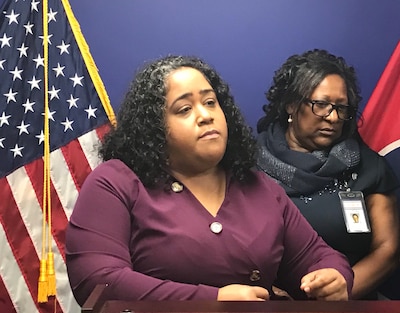Gov. Bill Lee and Tennessee’s Republican-controlled legislature are sticking with language in education voucher legislation that would check families’ immigration status to participate, even though doing so could land the state in court.
The Senate Education Committee voted Wednesday to advance Lee’s proposal to create education savings accounts, a new form of vouchers, through legislation that is one hurdle from a floor vote in the full House of Representatives.
The Senate’s just-introduced bill is different on several key points in Lee’s effort to give taxpayer money to some parents to pay for private school tuition or other private education services. It would double the size of the program to 30,000 students, add homeschoolers who were dropped from the House version, and allow participants to take national tests instead of annual state assessments.
However, the Senate bill retains House language requiring applicants to provide government-issued documents like birth certificates, driver’s licenses, or passports. That provision could be in conflict with a 1982 U.S. Supreme Court ruling that requires states to offer public education to all children, regardless of their immigration status.
Groups that advocate for Tennessee’s Hispanic families were quick to point out potential legal repercussions if the bill becomes law and makes children with undocumented parents ineligible for a publicly funded education program.
“Tennessee faces a lengthy and uphill legal battle against previously established case law prohibiting discrimination on the basis of national origin in public education,” said a statement from Conexión Américas in Nashville.
Leaders for the Tennessee Immigrant & Refugee Rights Coalition said they were “deeply disappointed” in Lee and predicted that the legislation is “doomed to fail in the courts.”
“Rather than rooting his vision for our schools in equity and fairness for all Tennessee children, he’s bucking the Constitution, federal law, and common-sense public policy,” policy director Lisa Sherman-Nikolaus said in a statement.
Meanwhile, the legislature’s Republican leaders have vetted the provision with members of their legal team, along with input from state Attorney General Herbert Slatery III.
Lee, who says his proposal will help students in low-income families who attend failing schools, supports the language and has said the bill is constructed to withstand constitutional muster.
Voucher supporters and critics have been battling in Tennessee for more than a decade over various bills. So far, the legislature has passed only one into law. An education savings account program serving students with disabilities is now in its third year and has 137 students enrolled.

Lee’s plan would be significantly larger, starting with 5,000 students in 2021 in five cities with the state’s lowest-performing schools, and providing those families with a yearly average of $7,300.
The measure is opposed by groups representing the state’s teachers, superintendents, and school boards, but has broad support in the legislature, where the new governor is exerting his political capital after being elected by a wide margin on a platform that included giving parents more choices for educating their children.
The provision targeting undocumented students was added in the House last month after the Federation for American Immigration Reform warned that the new government program could benefit people without legal authorization to be in the country.
Wednesday’s two-hour Senate discussion focused primarily on whether funding education savings accounts would hurt public schools and the effectiveness of similar programs in other states.
Only one question — from Sen. Raumesh Akbari of Memphis, the committee’s sole Democrat — focused on the provision targeting undocumented students. She asked Sen. Dolores Gresham of Somerville, who is shepherding the bill for the governor, why that language was not removed.
“That documentation, I think, is just actually pretty routine,” said Gresham, who last week said she was looking into the constitutionality of the language.

“I really don’t like to move forward with things that might potentially be ruled as unconstitutional,” said Akbari, one of three committee members who voted against the measure.
The bill heads next to the Senate finance committee, while the House bill also advanced Wednesday from a subcommittee to the full finance panel. If approved there, both bills would be scheduled for votes before their full chambers.
According to the Migration Policy Institute, roughly 7,000 undocumented children, ages 3 to 17, are enrolled in schools in Shelby and Davidson counties, two of the six districts that would be affected by Lee’s proposal. The institute also reports that tens of thousands of Tennessee children live with an undocumented relative.

